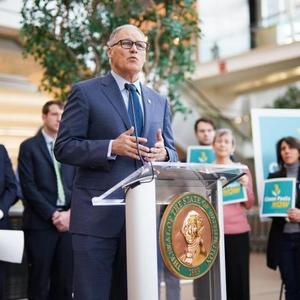Washington Gov. Inslee urges state to adopt Clean Fuel Standard

Photo: Port of Seattle
January 14, 2020
BY Erin Voegele
Washington Gov. Jay Inslee visited the Port of Seattle Jan. 10 to call on the state legislature to adopt a Clean Fuel Standard during its 2020 legislative session. He was joined at the event by Alaska Airlines, which has announced its support for the program.
The Washington House of Representatives voted in favor of a bill, HB 1110, to establish a Clean Fuel Program in March 2019. The state’s Senate, however, failed to vote on the legislation during the 2019 legislative session. State Rep. Joe Fitzgibbon, who sponsored HB 1110, has indicated his intent to move the bill to the House floor for a vote early in the 2020 session and to work with Senate advocates to secure passage of the bill.
The bill directs the Washington State Department of Ecology to adopt a rule establishing a Clean Fuel Program that would limit greenhouse gas (GHG) emission per unit of transportation fuel energy to 10 percent below 2017 levels by 2028 and 20 percent below 2017 levels by 2035.
Information released by the Port of Seattle notes Alaska Airlines is among the first major airlines to announce its support for a statewide Clean Fuel Standard in Washington. The program is expected to create an incentive mechanism for airlines to promote the use of sustainable aviation fuels.
Advertisement
The Jan. 10 event included a wide range of supporters, including state lawmakers, Renewable Energy Group, Neste and others.
“Transportation is far and away our state’s largest source of carbon pollution—making up nearly half the total,” Inslee said. “The Clean Fuel Standard is the cheapest and best opportunity we have, bar none, to reduce carbon pollution from transportation at this scale.”
“Washington has the opportunity to lead the world in the development of clean, sustainable aviation biofuels because of our innovative aerospace sector, our international hub airport, and our abundant farms and forests to produce biofuel feedstocks,” Fitzgibbon said. “Policy support such as a Clean Fuel Standard is a critical tool to get the sustainable aviation biofuel sector off the ground by scaling up the production of on-road biofuels. Communities impacted by pollution, particularly those near highways and airports, are counting on a transition towards cleaner burning fuels, and it’s time for the Legislature to accelerate this transition by adopting a Clean Fuel Standard.”
Advertisement
A statement released by the port notes California, Oregon and British Columbia all have working clean fuels policies in place. Washington State is the only West Coast state without such a policy. As a result, the port said Washington-produced renewable fuels are being sent out of state and sold into markets for clean fuels generated by these policies. Meanwhile, people in Washington spend approximately $9 billion annually on mostly imported gasoline and diesel.
“At the port, we see a clear, operational need for enactment of a Clean Fuel Standard in order to begin the process of creating a strong market for these clean energy alternatives in our state,” said Ryan Calkins, Port of Seattle commissioner. “The consequences of global climate change are here. Addressing them requires urgent public policy action.”
“All of us care deeply about the long-term health and vibrancy of our incredible region and the globe,” said Diana Birkett Rakow, vice president of external relations at Alaska Airlines. “At Alaska, we’re thinking about what it will take to scale production of sustainable aviation fuels and ensure they are commercially viable. Inclusion of a voluntary opt-in as part of a statewide Clean Fuel Standard will increase access to locally produced sustainable aviation fuel and help our industry meet ambitious commitments to reduce greenhouse gas emissions on a lifecycle basis.”
The Sustainable Aviation Fuels Producers Group together with the Biotechnology Innovation Organization and the Low Carbon Fuels Coalition issued a statement Jan. 10 commending Alaska Airlines’ support for including sustainable aviation fuels on an opt-in basis in Washington’s proposed Clean Fuel Program.
“Alaska Airlines’ support of Washington’s low carbon fuel legislation signals that transportation companies who look to the future are embracing renewable fuel policy,” the groups said. “Alaska is the dominant carrier at the rapidly expanding Sea-Tac Airport and has been at the forefront of utilizing sustainable aviation fuel to lower carbon emissions. Standing with Gov. Inslee, Climate Solutions, the American Lung Association and the Auto Alliance, the aviation industry is working to decarbonize the skies.”
Related Stories
Luxury North Dakota FBO, Overland Aviation—together with leading independent fuel supplier, Avfuel Corp.— on May 19 announced it accepted a 8,000-gallon delivery of sustainable aviation fuel (SAF) on May 12.
A group of 28 House members on May 16 sent a letter to President Donald Trump urging his administration to adopt timely, robust Renewable Fuel Standard renewable volume obligations (RVOs) for 2026 and beyond.
Neste and FedEx, the world’s largest express cargo airline, have agreed on the supply of 8,800 metric tons (more than 3 million gallons) of blended Neste MY Sustainable Aviation Fuel to FedEx at Los Angeles International Airport (LAX).
A bill to formally adopt a revenue certainty mechanism to support the production of SAF was introduced in the U.K. Parliament on May 14. The proposed scheme is in the form of a guaranteed strike price.
Delta Air Lines on May 7 announced its strong support for new bipartisan, bicameral legislation that will accelerate the growth of sustainable aviation fuel (SAF) in Michigan. The bill aims to create a SAF tax credit of up to $2 per gallon.
Upcoming Events










